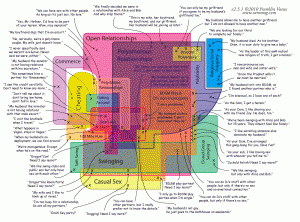I recently ran into a thread on one of the polyamory groups I belong to where someone asked for clarification as to what “Hierarchical Polyamory” was, and the first answer was to link to this page of Frank Veaux’s polyamory site:
https://www.morethantwo.com/polyconfigurations.html
Well, there are some things that Mr. Veaux writes which I think are true, even insightful, and other things I disagree with, some very strongly. What people miss when someone like Mr. Veaux writes a book, or authors a site, is that Mr. Veaux is no more of an “authority” on polyamory than I am… or that Deborah Taj Anapol was… or that Morning Glory Ravenheart Zell was, or that *ANY* poly person is. We each have our own journey, and when we write about our journey, and our perspective, we’re trying to explain a phenomenon which we are a part of, but which *NONE* of us “owns.” And one of the problems about getting an understanding of “hierarchical” polyamory is that no one I know who practices polyamory who uses labels like “primary”, “secondary”, “tertiary”, etc., defines it as a hierarchy or would use the term “hierarchical polyamory” which people like Mr. Veaux seem to have stuck us with. From my exploration of the websites being used to explain the phenomenon, it seems to be primarily, if not exclusively, those people who have constructed the term “polyamory anarchy” who are *APPLYING* that label to people whose relationships they either don’t understand, or whose type of relationships don’t work for them. That’s about as valid as monogamous people getting to label polyamory as “cheating” or “promiscuity” because they can’t fathom it, or have tried it and it didn’t work for them.
What people ignore when they call it “hierarchical” polyamory is that the labels do not imply a hierarchy, because a hierarchy is not established that implies that some people are more important than others, but simply denotes that some people in the relationship *commit* more to a specific “cells” within the “pods” (pods is such a good word, but it’s hard to explain when there are groupings within a pod… someone give me a better word. Might we use “hearths”?… yes… I’m going to use hearths.) So I’ll amend that to hearths within the pod, although people who see polyamory as radical may prefer cells.
The way that I, as someone who has been in a relationship that used the term, have always explained the labeling of “primary”, “secondary”, “tertiary”, “satellites”, etc. is that the labels indicate how connected the person is to the family. So looking at it as a pod, with perhaps multiple hearths within the pod, the labels indicate how connected, or committed, someone is to a specific hearth within the pod. If one is committed to that hearth, i.e., living in a marital type relationship, bonded perhaps by vows or some other promise, sharing resources, etc., *THAT*, that commitment is what makes them a “primary” within the hearth. This is consistent with how those that I’ve known who have been a part of the poly movement since the 60s, before the term was even coined, like the Ravenhearts, have always defined it. And there is, and never was, anything which is/was counter to egalitarianism in that thinking.
My example is when I was in a polyandrous marriage, *both* of my husbands were “primary” to me. One was “senior” because he’d been there longer, the other was “junior” because he was newer, but all those labels were was a way to explain to people something that didn’t really matter within the relationship – who was there first.
Secondaries might be people who didn’t share resources, but were emotionally committed to the hearth. Tertiaries might be people who had little commitment to the hearth, but who were emotionally committed to one or more people within the hearth. Satellites might be people who were just erotic friends of someone within the hearth. Each family determines their criteria, but *NONE* of that criteria has to do with who is more “important” as a person, simply who is more connected via the sharing of resources, or who is more committed to the hearth.
So I dislike the term “hierarchy” because it implies power, and specifically power over, which isn’t actually accurate. What is more accurate is that the terms signify levels of commitment to a specific family or hearth within a polyamorous pod and perhaps within an expansive polyamorous network.


I hadn’t even heard of the term “Hierarchical Polyamory” until this post. The term strikes me as rather silly.
But it is lovely to see a post from you 🙂 *hugs*
Hierarchical polyamory gets a lot of flack in poly circles lately, so it’s good to have it explained. This is a guest post by my friend Cat Deville 🙂